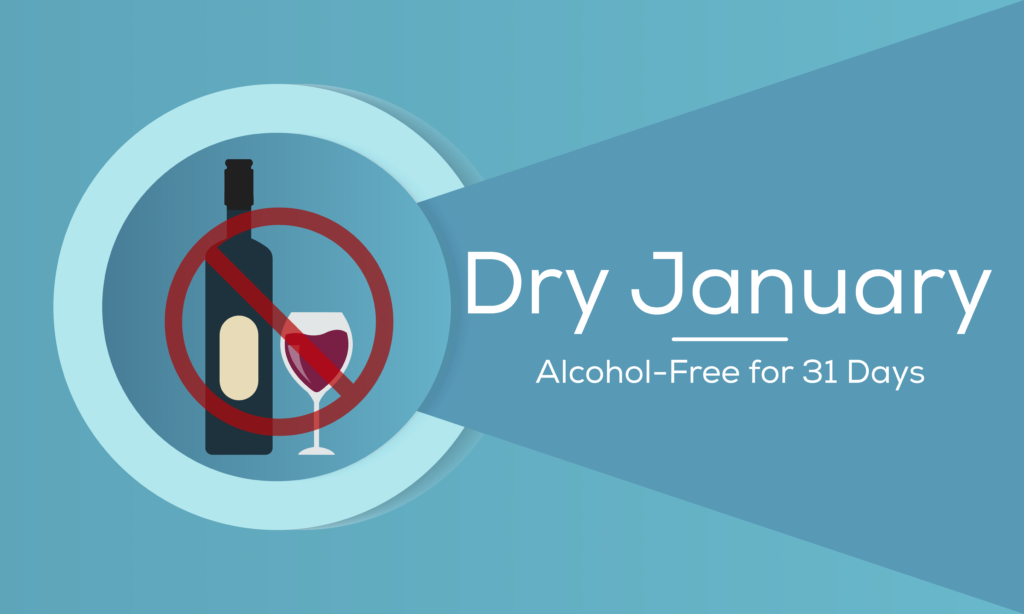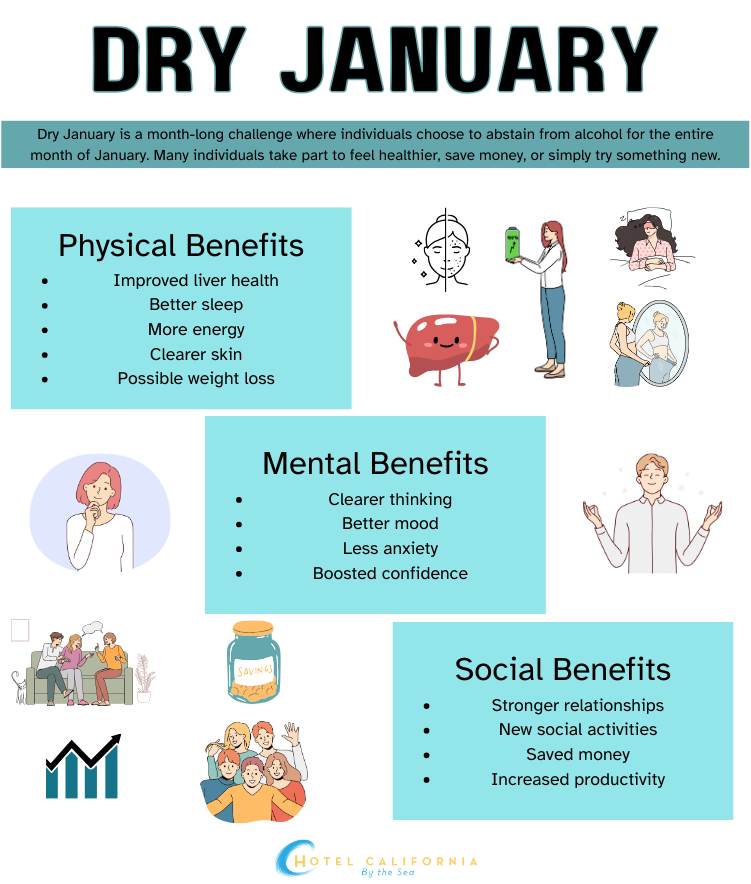Dry January Health Benefits
It’s a new year. That means it’s also time to set new goals. January is a popular month for many to set new health goals including weight loss, changing diets and improving on exercise and physical activity. What started as a public health initiative and motivational health challenge, has now become an increasingly growing phenomenon worldwide. Dry January. The dry January challenge was started by the non-profit organization Alcohol Change UK back in 2013. The dry January challenge consists of participants abstaining from alcohol for the entire month of January, typically 31 days. This includes all alcoholic beverages such as beer, wine, cocktails and spirits. An estimated 8.8 million people worldwide participated in dry January in 2023.

Today more and more young people and adults are becoming sober curious. According to market researcher Civic Science, a 2024 study shows 42% of American adults indicated they have begun seriously reflecting on their alcoholic holiday consumption. This increased from 33% back in 2022. Alcohol consumption can happen at any time, but it is especially prevalent during the holidays with more social gatherings of friends and family. The spike in alcohol use during the holiday season results in about 47% of men and 40% of women binge drinking.
The Impact of Alcohol on Health
Alcohol has been scientifically and clinically linked to a variety of health concerns. Drinking alcohol can affect your mental health, heart health, liver health, your gut microbiome and increase your risk for certain cancers. Cancers including oral cancer, throat cancer, colorectal cancer, esophageal cancer, liver cancer and breast cancer have all been associated with alcohol intake and excessive alcohol drinking patterns.
Excessive drinking can lead to other chronic conditions such as high blood pressure, heart disease as well as liver disease. Not only that, women who drink excessive amounts of alcohol or have alcohol use disorder are at higher risk for developing brain damage and heart damage.

Dry January Health Benefits
- Weight loss – Cutting out alcohol can cut out tons of empty calories and help you lose weight. Alcohol has no nutritional value and can often interfere with muscle building. Alcoholic drinks are also often filled with sugary additives. This results in an excess of calories causing weight gain.
- Improved diet – Because you are no longer consuming alcohol, it also motivates you to make other healthier changes in your overall diet. Less sugar intake and less intake of empty calories.
- Improved sleep – Alcohol in excess can often cause adverse effects such as rebound insomnia. Alcohol also impacts deep sleep because it suppresses stages 3-4 of sleeping which is the restorative sleep stage for helping muscles and other parts of the body and brain. During these stages, growth hormones are secreted at different levels and are used as an anti-aging hormone for faster body healing. This can also improve energy levels because users are no longer feeling tired and lethargic from sleep disturbances.
- Gut microbiome repair – Heavy and excessive alcohol consumption can impact the gut microbiome health and upset the balance of bacteria in your stomach. It can lead to the development of toxic metabolites and even cause a condition called leaky gut. Abstaining from alcohol for even a short period of time can heal and re-balance the gut bacteria in your stomach.
- Liver regeneration – Alcohol heavily impacts the liver. Because alcohol is processed in the liver, drinking in excess will constantly put the liver to work and often cause it harm because it cannot keep up with the amount of alcohol being consumed. During alcohol cessation, the liver will be able to regenerate within 30 days or so and be able to function properly and efficiently.
- Improvement in mental clarity – According to the National Institute on Alcohol Abuse and Alcoholism, alcohol interferes with communication pathways in the brain and can impact executive functions such as memory and judgment. When alcohol is removed, users no longer suffer from alcohol-related brain fog.
- Reduced risks for cancer
- It can help drinkers assess and analyze their drinking habits.
Check Your Insurance Coverage for FREE
Find out if your insurance covers addiction treatment in minutes. We accept most insurance!
Is Dry January for everyone?
Dry January may seem like a fun and motivational challenge for those who want to build a healthier relationship with alcohol or just want to improve their overall health in general. And for the most part, this is the purpose of the challenge. Light drinkers or occasional drinkers may find it easier to abstain from alcohol. Those who participate and are successful for a month are typically those who drink in moderation so it is not making a significant difference in their health.
However, for some who have a more problematic relationship with alcohol, dry January can be more difficult and even dangerous. Heavier drinkers may have a harder time abstaining from alcohol use because they may be physically and psychologically dependent on alcohol. In fact, dry January is not recommended for heavy drinkers. According to Massachusetts General Hospital, heavy drinkers who go cold turkey with alcohol can experience mild to severe withdrawal symptoms. Symptoms may include shaky hands and tremors, anxiety, nausea, vomiting and insomnia. When withdrawal is left untreated, it can progress into dangerous and life-threatening conditions such as seizures and delirium tremens.
Tips for a Successful Dry January
- Find substitute nonalcoholic drinks. These include sparkling water, soda, mocktails, alcohol-free beer or alcohol-free spirits. There are so many more non-alcoholic beverage options now.
- Avoid temptation. Keep alcohol out of the house, bring non-alcoholic beverages when attending a social function and learn to say no when being offered an alcoholic drink.
- Create or join a support group. Let your friends and family know you are participating in the challenge, and encourage others to try or join a group that is also abstaining from drinking. Doing it together with others can make it less daunting and can also hold you accountable for staying on track.
- Pay attention to how you feel and reflect on the way drinking makes you feel. Why do you choose to drink? Why are you choosing to stop drinking? Are you getting better sleep? Do you have more energy?
- Don’t give up. Don’t feel guilty or ashamed if you happen to slip up. Stay motivated and begin again the next day. Focus on the positives of staying sober.
- Have a plan in place for when the challenge is over. Will you go back to your old drinking habits? Will you have a new perspective on drinking? Will you develop a newer or healthier relationship with alcohol?
- Embrace your new alcohol-free attitude.
Reach out to Hotel California by the Sea
We specialize in treating addiction and other co-occurring disorders, such as PTSD. Our Admissions specialists are available to walk you through the best options for treating your addiction.
Treatment of Alcohol Use Disorder
Can cutting out alcohol for one month make a significant impact on a person’s health? Researchers and clinical experts have mixed feelings about the benefits of dry January. However, they do agree that there are some short-term benefits that can eventually lead to long-term reduction in alcohol intake. For those who are looking to start the new year on a healthier note, dry January could be a kick-starting point. For those who are struggling with their relationship with alcohol, dry January can be a wake-up call and professional help is needed.
Hotel California by the Sea provides treatment for alcohol use disorder. We provide treatment at all levels of care including detox, residential, PHP and IOP. We utilize evidence-based treatment methods such as CBT, DBT and EMDR therapy. Hotel California by the Sea is dedicated to helping our clients achieve their sobriety goals and overcome their addiction.
References:
https://www.mdanderson.org/cancerwise/should-you-do-dry-january-experts-weigh-in.h00-159703068.html
https://www.bbcgoodfood.com/health/wellness/dry-january-benefits-drawbacks
https://www.health.harvard.edu/blog/thinking-of-trying-dry-january-steps-for-success-202201032662
